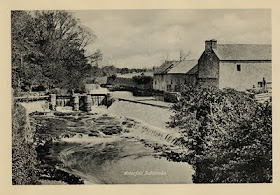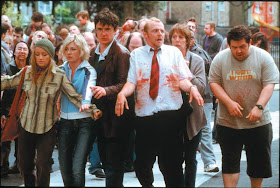I can't help wondering why so many politicians keep calling for a new approach to politics Aren't the same politics we've been using for the last 10,000 years good enough? Maybe the real problem lies not with the lying, two faced, double dealing, back-stabbing, opportunistic, insincere politicians we have, but with the idiots who vote for them: i.e. us. Check my math, please: politicians lie, politicians get elected. Could there be a connection? Let me give you a little example from ancient history, so nobody feels insulted.
James K. Polk (above) was America's eleventh President, serving from 1845 to 1849. He was, until Richard Nixon, our most secretive President. He did not even tell his own cabinet members what he was thinking. He was a Jackson Democrat, and no matter what your history books tell you he did not campaign on the phrase "Fifty-Four Forty or Fight" – that came up later. During his actual campaign for President, Polk was most famous for insisting he did not brand his slaves. And trust me, this smear was so good they still haven’t figured out who did it.
The story was first published in the 21August, 1844 edition of the Ithaca New York "Chronicle". It was a a Whig Party newspaper. And the story claimed to be a letter to the editor, quoting a three paragraph extract from an unpublished book, titled “Roorback’s Tour Through the Western and Southern States…” The extract claimed to detail Baron Von Roorback's conversations with a group of slave traders on the Duck River in Tennessee. “Forty of these unfortunate beings had been purchased, I was informed, by the Honorable J.K. Polk…; the mark of a branding iron, with the initials of his name on their shoulders, distinguishing them from the rest.” Now, even in 1844 the idea of branding human beings, even those treated as slaves, was appalling to many people...even in places where the economy had been built on slavery.
Which was why the story was picked up by the "Albany Evening Journal", and other Whig newspapers, particularly in the 1844 “battleground states” of New York, Ohio and Pennsylvania. Many voters in those swing states were outraged that a man standing for President would do something so despicable as to brand human beings the same way you brand cattle. To Whig politicians the story from "Roorback’s Tour" was almost too good to be true. And almost as quick as Republican bloggers caught Dan Rather, the Democratic press found out there was no such book and no such Baron. The details about Polk had been inserted into a real travel book, of a run in with some slave traders on Virginia’s New River. Polk’s farm was in Tennessee, so the inventor of the smear had shifted the scene to where it would do the most good. Besides, it was not common practice to brand slaves. Like whipping scars, branding tended to reduce their value as property, since it indicated this slave had a tendency to escape. Slaves were certainly whipped and branded because in 1844, most Americans still believed black slaves were property and would have been equally offended if some government official tried to tell them how to treat their horses or how to slaughter their hogs.
Still, embarrassed at being caught repeating what was so obviously a fabrication, the Whigs pinned the whole thing on William Linn, a lawyer and a Democratic operative in Ithaca. But why would a Democrat smear his own candidate? Well, if I were a believer in conspiracy theories, I might say that this kind of allegation against Polk was actually a fairly safe charge to make. Polk did own slaves, but his Whig opponent in the election, Henry Clay, owned even more slaves than Polk did. And it has been suggested by some historians that the “Roorback” story was a case of nineteenth century “wedge” politics. Abolitionism was still a minor issue in 1844, but abolitionists formed a solid voting block in New York, Ohio and Pennsylvania, those key battleground states. Convince enough abolitionists in those states that the Whigs were lying to them, and they just might choose the Democrat Polk over the Whig Clay as the lesser of two evils. And the letter to the Ithaca Chronicle had been signed, “An Abolitionist”, thus adding insult to the injury.
Well, maybe....And maybe that theory implies a level of sophisticated conspiracy that did not exist in the simpler culture and times of 1844 – and certainly would not have existed in Athens in 415 B.C., when Alcibiades was accused of vandalizing statues of the god Hermes.
You see Hermes was the mythical inventor of fire, and "...a robber, a cattle driver, a bringer of dreams, a watcher by night, a thief at the gates....who protects and takes care of all travelers, miscreants, harlots, old cronies and thieves and injured athletes". Each Greek home had an anatomically correct statue of Hermes standing on its front lawn, and it was common practice for visitors to pause at the stature and stroke his stone phallus for good luck before knocking on the front door. And when the owner left the house for the day or on a business trip, they would also give the statue a tug for good luck. And that was why it was so shocking that on the morning that Athens was launching a massive naval assault on Sicily, the city awoke to discover that every home statue of Hermes had its phallus knocked off during the night.
It sounds to my modern ears as if the neighborhood kids had been drinking sour wine on the street corner and started smashing phalluses as a prank. But to the devout in Athens (and there were many who believed in the gods) it was also sacrilege. And rumors began almost immediately that the person responsible was the golden boy politician who was heading the expedition, and known for his past sacrilegious opinions, Alcibiades (above). Of course Alcibiades had his own theory. He thought it had been the work of his chief political opponent and co-commander of the Sicilian expedition, Nicias. Two thousand five hundred years later, it is impossible to know who the phallus hackers really were and why they were whacking off in the dark.. But whether they planned it all or just took advantage of the situation, the one thing we know for certain is, that the people arguing both sides of the scandal were politicians.
The point is, politicians have been gaming voters since voting was invented. And voters have been playing along, else the game would not have remained so popular for so long. And that is why when a politician tells me he is selling something new, especially when it is something I want to believe, my first reaction is, “Pull the other one.,” When the American political system works (which it has not been doing recently) it is been based upon pragmatism, as it was in the 1844 election. Polk won 49.5% of the popular vote to Clay’s 48.1 %, and part of that razor thin margin was victories in New York and Pennsylvania - by less than 6,000 votes in both states. Those two states gave Polk 62 Electoral Votes, out of his sixty-five vote margin of victory (170 to 105). It seems that if the Roorback story was a double blind trick, it worked.
Oh,... and remember the phrase “Fifty-Four Forty or Fight!”? That was not used in the 1844 election. Well, it was actually invented by Ohio Senator William “Earthquake” Allen, known for his thundering speeches, and he used it well after the election. The number was the Southern border (54 degrees & 40 minutes of latitude) claimed by Russia when they owned Alaska. A simple glance at a modern map will confirm that the modern border between America and Canada, agreed upon by President Polk, was (and is) the 49th parallel. So much for the “…Or fight!” part of the slogan. Have you noticed how often politicians don’t actually mean what they seem to say? You might say they make a career out of it. And always have. And we keep buying what they say. 

- 30 -































































